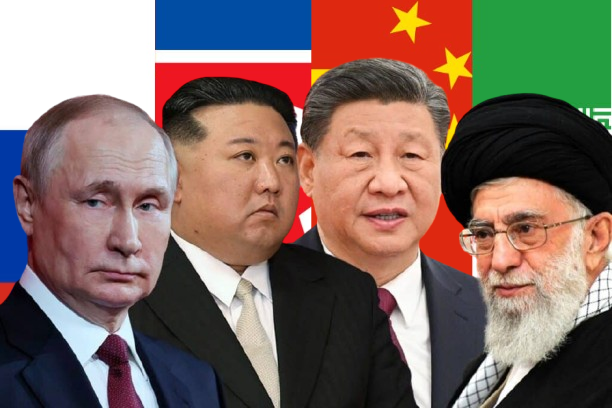
- The new Gang of Four consisting of China, Iran, North Korea, and Russia is not a formal alliance committed to defending one another but an alignment driven by shared opposition to the existing US-led world order.
- China opposes war-related sanctions on Russia, remains the largest importer of Iranian oil, and continues to subsidize North Korea. Iran has supplied missiles and drones to Russia, while North Korea has provided artillery shells, and China has reportedly supplied dual-use technologies with military applications.
- To confront this challenge, the US, in coordination with South Korea, could explore relaxing sanctions on North Korea in exchange for steps by North Korea to limit the scale of its nuclear and missile programs.
China, Iran, North Korea, and Russia do not have a formal alliance committed to defending one another. However, they have formed an alignment driven by shared antipathy toward the existing US-led world order. This presents a complex challenge for the United States and its allies.
The term “Gang of Four” was originally used to refer to four senior Chinese officials closely associated with radical features of the Cultural Revolution. However, a new Gang of Four has emerged in China, Iran, North Korea, and Russia. This grouping is not a formal alliance committed to defending one another but an alignment driven by shared opposition to the existing US-led world order. This alignment features mutual exchanges of military, economic, and political support.
The Gang of Four aims to prevent the spread of Western liberalism domestically, which they see as a threat to their hold on power and to the authoritarian political systems they lead. They also oppose US leadership abroad, including the prohibition of acquiring territory by the threat or use of force.
The mutual support among these countries takes several forms. For example, on the eve of the invasion of Ukraine in February 2022, China signed an agreement with Russia, expressing unlimited mutual friendship, while Russia voiced support for China’s position on Taiwan. China has echoed Russian talking points about the war in Ukraine, blaming NATO for it, and amplifying Russian misinformation.
In the economic realm, China has opposed war-related sanctions against Russia and is the world’s largest importer of Iranian oil. Additionally, China has long subsidized North Korea. Militarily, Iran has provided missiles and drones to Russia, North Korea has provided artillery shells, and China seems to have provided dual-use technologies and industrial inputs with military applications to Russia. In return, Russia has reportedly assisted these countries in improving their nuclear, missile, or submarine programs, and has shared intelligence about Western weapons systems gleaned from its war with Ukraine.
Counteracting this alignment is not a simple task. There is no diplomatic opportunity to exploit divisions between them, unlike in the early 1970s when the US leveraged Sino-Soviet tensions to draw China toward the West. Furthermore, China is fundamentally different from the other three countries. It is integrated into the global economy and is a major trading partner for many countries in the Western security orbit. Efforts to isolate China economically or to use trade and investment to shape its behaviour will have a limited impact.
In contrast to Iran, North Korea, and Russia, China seeks not to overturn the existing international order but to bend it toward its foreign-policy goals. Iran, North Korea, and Russia are far less integrated into the global economy, but they have each other as a source of imports and markets. North Korea is the most isolated of the four, but its vulnerability to sanctions is limited by China’s interest in preventing it from collapsing. Russia, given its reliance on North Korean artillery, will likely provide greater assistance to Kim Jong-un’s regime.
To confront this challenge, the US, in coordination with South Korea, could explore relaxing sanctions on North Korea in exchange for steps by North Korea to limit the scale of its nuclear and missile programs. Close ties between the US and South Korea should work to discourage North Korean aggression. Russia must not prevail over Ukraine, and this requires maintaining long-term military support for Ukraine while extending security assurances and European Union membership.
In the case of Iran, the long-term priority must be to ensure, through diplomacy or the threat or use of military force, that it does not develop nuclear weapons. The immediate goals should be to rein in Tehran’s support for its proxies across the Middle East and to prevent the Israel-Hamas war from spiralling into a regional conflict.
Overall, addressing the challenges posed by this alignment requires a multifaceted approach that considers the unique characteristics and motivations of each of these countries.
